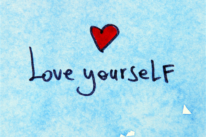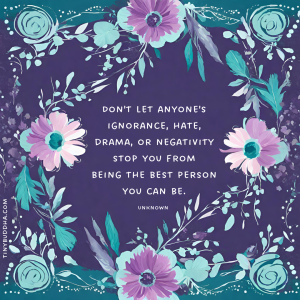
“Be gentle first with yourself if you wish to be gentle with others.” ~Lama Yeshe
Several months ago, I sat in a large workshop audience being led by Kristin Neff, a pioneer in the field of self-compassion research.
She directed us to divide up into pairs for a self-compassion exercise. I turned to the young woman next to me. We introduced ourselves and returned our attention to Kristin.
Following her instructions, my partner closed her eyes while I sat looking at her. Kristin led those of us with open eyes through a loving-kindness meditation that was directed at our partners.
Although I did not know this young woman, I could feel my heart open wide to her as compassion arose within me. I felt warm and loving toward her.
Then it was my turn to sit with closed eyes. As Kristin repeated the meditation and I felt my partner’s loving gaze on me, I started to hear a voice.
Not a psychotic one, mind you, but that familiar voice that so often takes up my internal space. It had started chatting quietly but zoomed to full volume within seconds.
“You don’t deserve compassion! You don’t make enough money! You snap at Andrea all the time! You just need to get yourself under control!”
Sigh. So much for self-compassion.
But that was the point.
After the exercise, Dr. Neff asked, “How many of you found it harder to feel compassion toward yourself than the stranger sitting next to you?”
Just about everyone in that huge group—including me—raised their hands.
What is Self-Compassion Really About?
When we feel compassion for others, we feel kindness toward them, empathy, and a desire to help reduce their suffering.
It’s the same when you are compassionate toward yourself. Self-compassion creates a caring space within you that is free of judgment—a place that sees your hurt and your failures and softens to allow those experiences with kindness and caring.
And yet, with all of the wonderful things that come along with being kind to ourselves, we find it hard to actually feel it.
Why? Why are we so lacking in self-compassion?
4 Mythical Beliefs about Self-Compassion
The deficiency in self-compassion is likely brought about by these four untrue thoughts:
1. I’m just indulging myself if I’m self-compassionate.
That’s what my inner voice wanted me to believe during the workshop exercise.
But I’ve learned something important that helps me with that little critic—the difference between self-indulgence and self-compassion.
Self-compassion involves your health and well-being. Self-indulgence is about getting anything and everything you want without thoughts of well-being.
Self-compassion is about becoming aware of and sitting with your pain. Self-indulgence numbs and denies your pain.
2. I won’t be motivated if I don’t criticize myself.
Somewhere, deep down, you and I might actually believe that we need that inner critic to keep us motivated in life; that without it, we too easily stray outside the lines.
And it’s also possible that the critic evolved to help keep us safe from harm.
But guess what? We don’t need it anymore. Being compassionate with ourselves allows for a much healthier, kinder motivation.
As Kristin Neff says, “While the motivational power of self-criticism comes from fear of self-punishment, the motivational power of self-compassion comes from the desire to be healthy, to reduce our suffering.”
3. It’s selfish for me to be compassionate toward myself.
Many people, women especially, are taught to put others ahead of themselves. Self-compassion can seem like the opposite of what you “should” be doing: taking care of others.
But how will beating yourself up help you be kinder to others? The source of our compassion will only be more authentic when we are able to show compassion to ourselves first.
4. Self-compassion is for wimps.
Put on your big girl pants and stop whining!
Man up!
Pull yourself up by your bootstraps!
Our society tends to reward toughing things out more than it does being kind and nurturing to yourself.
But the truth is that the strongest people are also the ones who can buck cultural norms and feel genuine compassion for themselves and their circumstances.
3 Ideas to Create Compassion for Yourself
Throughout the last ten years of her research, Kristin Neff has found three main ways to generate more compassion for yourself.
1. Be kind to yourself
The best way to think about being kind to yourself is to think about a friend.
Go ahead. Do it now. Visualize your best friend.
Now imagine she comes to you and says she is hurting because she was passed over for that promotion at work that she’s wanted for so long.
Would you say to her, “Well, it’s probably because you didn’t work hard enough. And you’re too mousy. You should have spoken up about wanting a promotion a long time ago.”
What? You wouldn’t say that to a friend? Would you say it to yourself?
It’s more likely that you would hug your friend and say, “Oh no! That’s terrible. I know how long you’ve been hoping to get that promotion. Come on, let’s go get some coffee and talk about it?”
You can be kind to yourself in this way, too. Treat yourself as you would treat a friend who is suffering.
Just as you would hug your friend, soothe yourself as well. Put your hands over your heart or locate the spot in your body where your hurt is hiding and gently place both hands there.
Speak kindly to yourself. Call yourself by an endearing name.
“Oh, honey. I’m hurting because I wanted that promotion so badly. This is a really hard place to be in right now.”
2. Embrace your common humanity
Many times when you criticize or judge yourself, you feel isolated. It seems as though you are the only one in the world who has that particular flaw.
And yet, we are all imperfect. We all suffer. And so we are all connected by our shared humanity.
One of the wonderful outcomes of self-compassion is our enhanced sense of belonging, the feeling that we are all in this together.
The next time you are looking in the mirror and not liking what you see, remember that you are an integral part of a flawed, wonderful, wounded, miraculous human tribe.
3. Be mindful
How will you know that you are suffering if you are repressing your pain, rationalizing it, or busy with problem-solving?
You must allow awareness of your pain to enter in. Being mindful is about noticing what is happening in the moment and having no judgment about it.
Notice your hurt and just be with it, compassionately and with kindness.
And note that trying to make pain go away with self-compassion is just another way to repress pain and hurt. Self-compassion is about being with your suffering in a kind, loving way, not about making suffering disappear.
We will always have pain. But as Shinzen Young has noted: Suffering = Pain x Resistance. The more you resist your pain, perhaps by trying to make it go away, the more suffering you will experience.
Mindfulness allows you to stay with the pain without the resistance.
Near the end of the workshop, Kristin led us through one last exercise called “Soften, soothe, allow.” It combines all three of the components listed above to help generate self-compassion.
After thinking about a difficulty we have, Kristin directed us to find the place in our bodies that held our problem and then place our hands on it.
I placed both of my hands gently over my heart.
Then, we were encouraged just to be with our pain—not try to rid ourselves of it—and allow kindness and compassion to surround it.
As I sat meditating on something I have always considered to be a character flaw, tears arose under my closed eyelids and soon splashed down my face.
It was the first time I had ever felt kindness for myself about this very raw area rather than listening to my inner critic. The pain I felt was actually okay when held in this compassionate space, I didn’t need to be ashamed any longer.
The soft waves of compassion surrounding my heart had healed me of my shame.
I now choose self-compassion in my life, especially when that inner voice starts up.
Will you?
About Bobbi Emel
Psychotherapist Bobbi Emel specializes in helping people face life’s significant challenges and regain their resiliency. Download her free ebook, “Bounce Back! 5 keys to survive and thrive through life’s ups and downs.” You can find her blog at http://www.TheBounceBlog.com and follow her on Facebook (www.facebook.com/bobbiemel) and Twitter (@BobbiEmel.).













 Though I run this site, it is not mine. It's ours. It's not about me. It's about us. Your stories and your wisdom are just as meaningful as mine.
Though I run this site, it is not mine. It's ours. It's not about me. It's about us. Your stories and your wisdom are just as meaningful as mine.